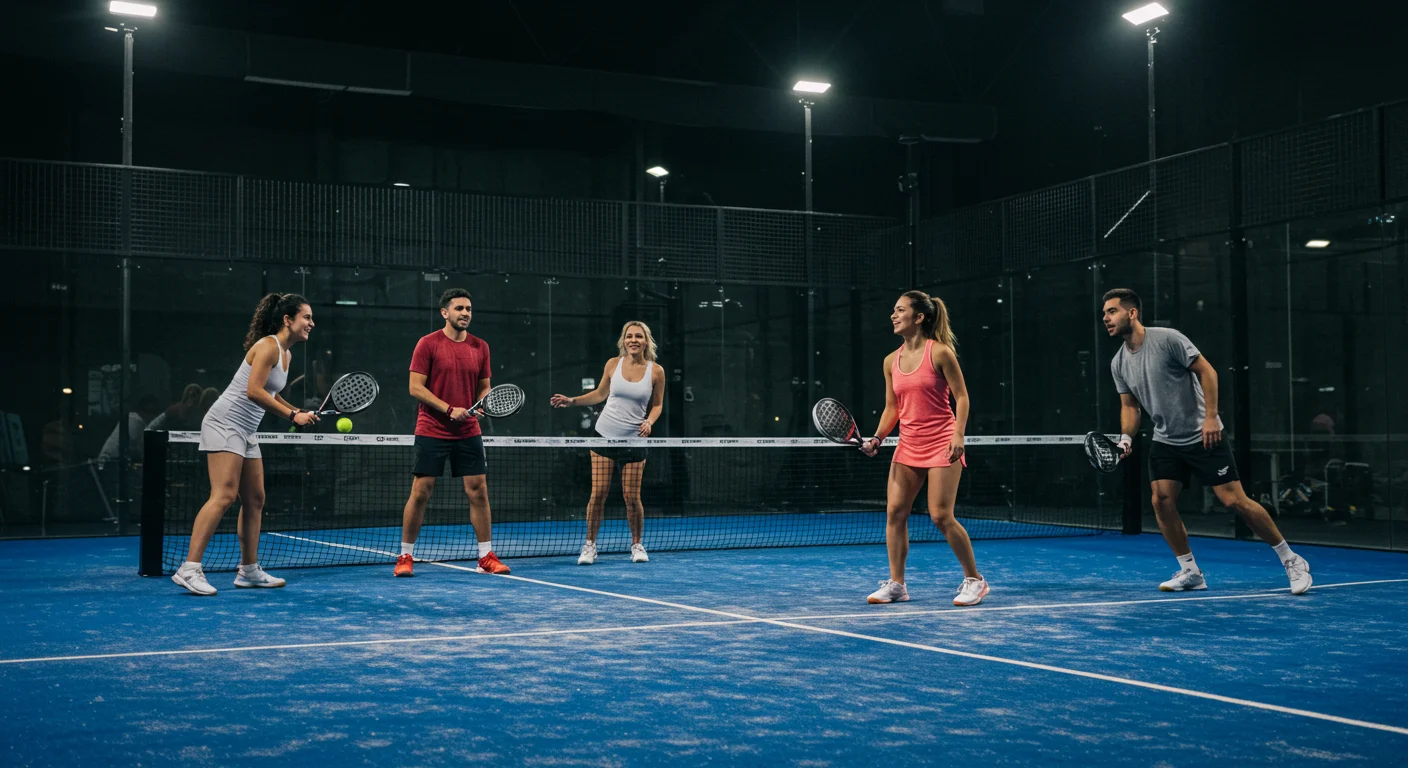Introduction
If there’s one sport that’s sweeping across Europe faster than a Dutch breeze across the North Sea, it’s padel. The Netherlands — traditionally known for football, cycling, and ice skating — has now found itself smitten by this fast-paced racquet sport. And at the heart of this boom lies NLPadel, the organization responsible for nurturing and shaping the sport’s future in the country.
Padel is more than just a game; it’s a social revolution in motion — a blend of tennis and squash that unites fitness, friendship, and fun in a glass-walled arena. As Dutch cities light up with new padel courts and communities, NLPadel stands as the beacon of structure, vision, and growth behind the movement.
What is Padel, and Why is It So Addictive?
Padel is a sport born from simplicity yet rooted in excitement. Played in doubles on an enclosed court smaller than a tennis one, it’s less about brute strength and more about strategy, teamwork, and rhythm. The glass walls allow for rebounds, extending rallies and making it far more forgiving for beginners — yet deeply tactical for seasoned players.
The Netherlands, a nation known for embracing innovation, quickly realized that padel checked all the boxes:
- Easy to learn, tough to master.
- Social, yet competitive.
- Weather-resistant, with the right indoor facilities.
- And above all, fun.
The Rise of NLPadel: A Story of Vision and Structure
Founded under the wing of the Royal Dutch Lawn Tennis Association (KNLTB), NLPadel was established to bring order and professionalism to the rapidly growing sport. In 2010, the Netherlands officially joined the International Padel Federation (FIP), signaling its intent to play a major role on the global padel stage.
The KNLTB already had decades of experience managing tennis at every level — from local youth events to international tournaments. That expertise became the perfect foundation for launching padel’s structured journey. Under the leadership of Edu Jansing, the President of the Dutch Padel Federation, NLPadel has continued to develop a comprehensive system of coaching, competition, and club development.
Today, NLPadel is the central hub coordinating everything from player rankings to national events, licensing, and international representation.
Explosive Growth Across the Netherlands
If you drive across Dutch towns today, you’ll notice something remarkable: padel courts are popping up everywhere. Whether in Amsterdam, Rotterdam, Utrecht, or Groningen, there’s a growing network of bright-blue courts buzzing with energy.
In 2015, there were only a handful of courts across the country. By 2024, that number had soared past 1,200, with new clubs opening every month.
What’s fueling this explosion?
- Accessibility: Padel appeals to all ages and fitness levels.
- Community spirit: The sport naturally creates social circles, making it ideal for clubs and friends.
- Commercial interest: Investors see strong business potential due to high participation and membership demand.
- Media exposure: Tournaments, influencers, and sports personalities are spreading the word faster than ever.
According to KNLTB reports, over 130,000 registered players now participate in the sport — a massive increase compared to just a few thousand five years ago.
NLPadel’s Role in Shaping the Future
NLPadel isn’t just about organizing tournaments. Its broader mission involves building an ecosystem where players, clubs, and coaches can thrive. The organization works on multiple fronts:
1. Infrastructure and Club Development
NLPadel collaborates with municipalities and private investors to facilitate new court constructions, ensuring that communities across the Netherlands gain access to quality facilities. Sustainability also plays a major role — with eco-friendly surfaces and energy-efficient lighting being promoted in new builds.
2. Coach Education and Certification
To maintain high standards, NLPadel offers coaching certifications and professional development programs. This ensures players at every level receive structured, consistent training from qualified instructors.
3. Competitions and Ranking System
From local leagues to national championships, NLPadel manages the official ranking system and tournament calendar. This framework allows amateur players to progress smoothly into professional circuits, including FIP events.
4. International Collaboration
As part of the FIP, NLPadel helps represent the Netherlands in global competitions, ensuring Dutch players gain international exposure. This includes participation in events like the Padel World Championship and the FIP Rise Tour.
5. Inclusivity and Youth Programs
NLPadel places strong emphasis on youth development. Schools and community programs introduce padel to children early, building future generations of athletes. Efforts are also being made to make padel accessible for players with disabilities, ensuring the sport remains inclusive and open to all.
Technology and Innovation in NLPadel
It wouldn’t be Dutch if it weren’t innovative. From smart court lighting to AI-assisted training tools, NLPadel integrates technology wherever possible. Many clubs now use tracking systems that analyze player movements, ball speeds, and performance metrics.
Some facilities even feature augmented reality coaching tools — allowing players to visualize their techniques in real-time.
Online platforms managed by NLPadel offer digital scoreboards, match replays, and player statistics, helping the federation maintain a modern, data-driven sporting ecosystem.
Challenges in the Dutch Padel Landscape
Despite its rapid rise, padel in the Netherlands faces a few growing pains — ones that NLPadel is actively addressing.
- Overcrowding in Urban Areas: In major cities like Amsterdam, demand for court bookings often exceeds availability.
- Noise Complaints: Outdoor padel courts near residential zones have drawn occasional complaints due to the popping sound of the ball against glass walls.
- Balancing Tennis and Padel Resources: Some traditional tennis players worry that padel might overshadow tennis in terms of club funding and space.
- Weather Constraints: Though indoor padel is popular, it requires significant investment in infrastructure.
NLPadel has tackled these issues through urban planning guidelines, community engagement programs, and government collaborations to create harmonious multi-sport facilities.
The Social Impact of Padel in the Netherlands
One of the most beautiful aspects of padel is how it brings people together. It’s a social connector — more about interaction than isolation. After-work leagues, corporate tournaments, and family doubles matches have turned clubs into mini social hubs.
NLPadel’s campaigns emphasize mental well-being, teamwork, and lifestyle fitness rather than just athletic performance. The result? A sport that not only tones muscles but also builds friendships.
Interestingly, many Dutch companies are adding padel facilities to their corporate wellness programs, recognizing how it boosts morale and teamwork.
The Future Vision: Where is NLPadel Headed?
The future of padel in the Netherlands looks like a perfectly served smash — powerful, precise, and unstoppable.
1. Targeting 2000+ Courts Nationwide
NLPadel aims to double the number of courts by 2030, ensuring every major Dutch city has multiple accessible facilities.
2. Professional League Development
Plans are underway to create a Dutch Padel Premier League, offering televised matches and sponsorship opportunities that could rival domestic football and hockey broadcasts.
3. International Event Hosting
The Netherlands aims to host major FIP-sanctioned tournaments, positioning itself as a European hub for global padel events.
4. Digital Expansion
Through NLPadel’s online platforms, players can register, track rankings, book matches, and even stream competitions. This integration of sport and technology gives the Netherlands a competitive edge globally.
5. Sustainability Focus
As with most Dutch projects, sustainability remains a cornerstone. The goal is to ensure padel clubs use recyclable materials, efficient lighting, and renewable energy sources to reduce their carbon footprint.
Why the Netherlands is Perfect for Padel
The country’s flat geography, dense urban centers, and sports-oriented culture make it an ideal playground for padel. Dutch people love accessible, social sports that blend fitness with fun — exactly what padel offers.
Moreover, the collaborative mindset between government bodies, sports federations, and private investors creates a stable ecosystem where padel can grow sustainably.
The Netherlands also serves as a gateway for European padel expansion, linking Nordic countries, Belgium, and Germany through regional tournaments and joint training camps.
How NLPadel is Building a Lasting Legacy
At its core, NLPadel isn’t just promoting a sport — it’s cultivating a culture of connection. By fusing community engagement with athletic professionalism, it’s turning padel into a lifestyle movement.
Grassroots programs are key to this legacy. Schools and universities are introducing padel as part of their physical education curriculum. Meanwhile, clubs are offering affordable memberships and “try-out days” to lower entry barriers.
The long-term plan? To make the Netherlands a model padel nation — one that exports players, ideas, and management expertise to other countries.
NLPadel and the Global Context
Internationally, padel is one of the fastest-growing sports in the world. Spain, Italy, and Sweden currently lead the market, but the Netherlands is catching up quickly.
NLPadel’s structured approach mirrors Spain’s early blueprint: start with strong local leagues, invest in coaching, and gradually build professional circuits. The Netherlands’ membership in the International Padel Federation ensures continued exposure to global best practices and cross-border tournaments.
With FIP’s support, NLPadel has begun developing training programs for elite athletes, preparing them for international competitions — and eventually, the dream of padel being recognized as an Olympic sport.
The Cultural Shift: From Tennis Rackets to Padel Bats
Dutch sports culture has long been dominated by tennis clubs, but the shift to padel has been surprisingly smooth. Many tennis players found padel to be a refreshing change — quicker rallies, less pressure, and more social engagement.
Some clubs now offer hybrid memberships, allowing players to enjoy both sports under one roof. This symbiotic relationship helps both communities thrive rather than compete.
NLPadel’s strategic alignment with KNLTB ensures that tennis and padel grow hand-in-hand, rather than at each other’s expense.
Conclusion
Padel in the Netherlands isn’t a fleeting trend — it’s a movement. With NLPadel steering the ship, the sport has transitioned from novelty to national pastime in record time. The combination of structured governance, grassroots enthusiasm, and technological innovation has created an unstoppable force in Dutch sports culture.
From professional leagues to youth programs, NLPadel is ensuring that padel’s growth remains inclusive, sustainable, and exciting. The Netherlands is on track to become one of Europe’s leading padel powerhouses — not just for its players, but for the sense of community it builds around every court.
So next time you walk past a glass-walled court echoing with laughter and the rhythmic “pop” of padel balls — you’re not just witnessing a sport. You’re seeing the future of Dutch recreation, shaped by NLPadel, powered by passion.
FAQs About NLPadel
1. What is NLPadel?
NLPadel is the official governing body for padel in the Netherlands, operating under the Royal Dutch Lawn Tennis Association (KNLTB). It oversees competitions, coaching, player rankings, and club development.
2. When did the Netherlands join the International Padel Federation?
The Netherlands became a member of the International Padel Federation (FIP) in 2010, marking its official entry into the global padel community.
3. How many padel courts are there in the Netherlands?
As of 2025, there are approximately 1,200+ courts, with that number expected to double by 2030 due to increasing demand.
4. Can beginners join NLPadel events?
Absolutely. NLPadel hosts tournaments and leagues for all skill levels, from beginner to professional. Many clubs also offer beginner-friendly training programs.
5. What are NLPadel’s future goals?
NLPadel aims to expand court infrastructure, develop a national professional league, promote youth programs, and make the Netherlands a global padel hub.

